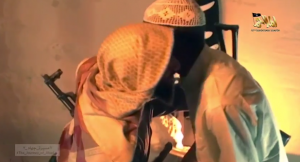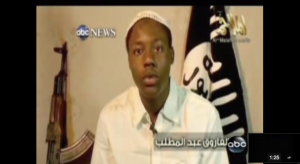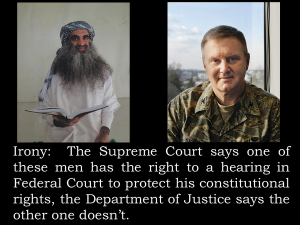How Trump’s SCOTUS Appeal Shows Why He’s Got a Weaker Legal Argument than a [Former] Gitmo Detainee
Trump has appealed the part of the 11th Circuit’s decision that ruled DOJ did not have to share classified documents as part of the Special Master process. Trump did not appeal the part of the decision lifting the stay on using the classified documents as part of the criminal investigation.
The parts of this pertaining to classified documents and Presidential authority are even more of a shit-show than the 11th Circuit response was, and for an audience that has actually considered these issues.
But parts of it are jurisdictional and would not be frivolous if this were simply a discovery dispute (as Chris Kise treats it), and not one pertaining to classified information. But it does pertain to classified records.
And that’s why I think this is the most important part of the argument. Trump attempts to dismiss the government’s argument that it could appeal Judge Cannon’s order that it share classified records with Judge Raymond Dearie and Trump.
In its reply before the Eleventh Circuit, the Government made a fleeting statement that orders to disclose classified information are immediately appealable as collateral orders. App. F at 10 (citing Mowhawk Indus., 558 U.S. at 113 n.4; Al Odah v. United States, 559 F.3d 539, 542–44 (D.C. Cir. 2009)). This assertion is without merit.
[snip]
In Al Odah, the Government appealed from an order granting defendant’s counsel access to unredacted “classified” information. 559 F.3d at 543. The District of Columbia Circuit, applying the Cohen test, determined it had jurisdiction to hear the appeal of the collateral order in that case. Id. at 543-44. However, the present case is distinguishable from Al Odah, primarily due to whom the “classified” or “privileged” documents are being disclosed. Unlike in Al Odah, where the unredacted classified documents were ordered to be disclosed to defendant’s counsel, here the materials in question will be provided to the Special Master—a Senior United States District Judge with years of FISA court experience. As Special Master, Judge Dearie will effectively act as an arm of the District Court. It can hardly be suggested that Judge Dearie’s review of these records is in any way akin to dissemination of previously unshared, unredacted, classified information to counsel for Guantanamo Bay detainees.
Additionally, the fact this dispute involves potential Presidential records14 creates a fundamental and significant distinction. Since any purported “classified records” may be Presidential records, President Trump (or his designee, including a neutral designee such as a special master) has an absolute right of access to same under the Presidential Records Act (“PRA”). 44 U.S.C. § 2205(3). Accordingly, President Trump (and, by extension, the Special Master) cannot in any event be denied access to those documents. Given this absolute right of access under the PRA, there is therefore no valid basis to preclude such review. Moreover, there cannot possibly be any valid claim of injury resulting from a statutorily authorized grant of access to a former President and/or his designee.
The Government argued on appeal, without explanation, that showing the purportedly classified documents to Judge Dearie would harm national security. App. D at 17. However, in seeking to stay the Injunction Order pending appeal, the Government then argued it needed to use those same documents to interview witnesses and submit to the grand jury. ECF No. 69 at 17. These positions cannot be reconciled.
14 Even the Government’s own Motion for Stay in the Eleventh Circuit acknowledged the obvious, that any purported “classified records” may be Presidential records. App. D at 10 [my emphasis]
At first, Trump argues that Cannon has not ordered DOJ to share classified records with anyone but Dearie. That’s false: She ordered DOJ to share classified records with Trump’s lawyers.
In fact, in the very next paragraph, Trump admits that Cannon’s order is worse to that in Al Odah a DC Circuit case decided per curiam by a panel including Merrick Garland. Fawzi Khalid Abdullah Fahad Al Odah was a plaintiff in a habeas petition — as an enemy combatant he hadn’t and never was charged with a crime — but he was challenging indefinite detention with inadequate due process. By comparison, Trump has not been charged and if and when he is charged, his lawyers will get to see the classified evidence against him. For now, he’s just a plaintiff and the record is uncontested that the warrant executed on his beach resort involved no gross abuse of his rights.
Without acknowledging that the claim Cannon only ordered DOJ to share with Dearie is false, Trump makes the argument that DOJ should have to share with Trump’s designees under the Presidential Records Act. As DOJ has already noted, of course, that’s only true of the records are where they are supposed to be: In the possession of the Archives. They’re not, and that’s part of the problem.
Another part of the problem is that, elsewhere in this appeal, Trump unquestioningly invokes EO 13526, which governed classified information for the entirety of his term and still does. As I’ve noted, that explicitly says even former Presidents must get waivers of Need to Know requirements to access classified information. Trump never changed that order before he became a former President.
In the next paragraph, Trump then complains that DOJ might complain about sharing all of this information with Dearie (and Trump’s lawyers) but might decide to share some of the information with witnesses. Again, elsewhere in this appeal, Trump unquestioningly invokes Navy v. Egan, which is the Supreme Court precedent that says the President — not the former President — gets to decide who needs access to classified information or not.
And nowhere in this argument do Trump’s lawyers admit something that DOJ laid out explicitly before the 11th Circuit: At least one of them, Evan Corcoran, is a witness or possibly even a co-conspirator (DOJ referred to his lawyers, plural, as potential witnesses, suggesting Lindsey Halligan (who was at Mar-a-Lago during the search) or Jim Trusty has had a role in the obstruction process as well. Of course, Trump also neglects to mention the obstruction part of the investigation, which makes all documents with classification marks proof that Trump defied a subpoena.
In other words, Trump is even more poorly situated than Al Odah, who at least had lawyers uninvolved in his potential security concerns. The only one of Trump’s lawyers who’s definitely not a witness, Kise, is also the one who recently was a registered agent of Venezuela.
As I keep saying in this matter, no one really knows how any of this will turn out. Trump’s argument that Ginni Thomas’ favorite President is no Gitmo detainee surely will work with Clarence, who will decide whether to take this appeal (or ask the entire court to weigh in). But along the way, Trump has compared himself unfavorably — legally, at least — with a former Gitmo detainee.
Update: This tweet thread from Steve Vladeck notes that Trump never describes what irreparable harm he faces if Dearie can’t review the classified records now.
Update: One more thing Trump doesn’t tell SCOTUS: That Judge Cannon has altered her own order, taking the classified documents out of it altogether, which makes Vladeck’s point about emergency relief even more hysterical.
Update: Justice Thomas has given the government a week to respond, which suggests even he doesn’t see this as the emergency it would have to be for SCOTUS to get involved.





